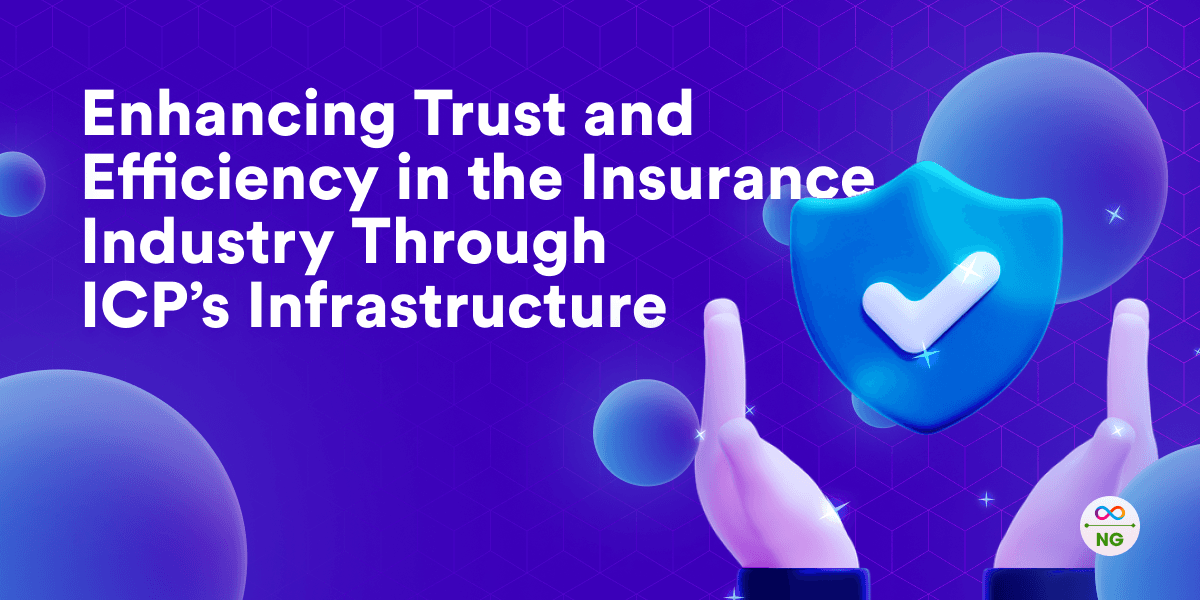Enhancing Trust and Efficiency in the Insurance Industry Through ICP’s Infrastructure
April 3, 2025

The insurance industry faces significant challenges in data governance, record-keeping, and regulatory reporting. A notable example is the Nigerian Insurers Association (NIA), which struggled to compile comprehensive industry data.
In 2020, financial reports lacked accurate insights into key policyholder demographics, including the number of insured women, age distributions, and public buildings covered. This systemic issue in data collection and management underscores the urgent need for a structured approach to data governance and engineering.
Blockchain is making waves across industries, and insurance is no exception. We're seeing some really interesting decentralized solutions come to life, built by blockchain developers.
Now, insurance is a pretty traditional industry, but it's starting to embrace blockchain. Imagine replacing all those paper contracts with a secure, digital ledger. That's where blockchain comes in, saving money and reducing errors. And platforms like the Internet Computer Protocol (ICP) can make this even more efficient.
With ICP, you could build things like smart contracts that automatically trigger payments or systems that cut out the middleman and boost efficiency. Industry experts should see blockchain as a game-changer, especially for things like pricing and risk assessment and creating new types of insurance.
Challenges in Data Governance within the Insurance Industry
- Fragmented Data Management: Siloed data across different insurance firms leads to inconsistencies in reporting.
- Inaccurate and Incomplete Records: Lack of real-time updates and structured data collection mechanisms result in missing key insights.
- Regulatory Compliance Risks: Without a standardized data governance framework, companies struggle to meet reporting requirements from regulatory bodies.
- Fraudulent Claims and Identity Verification Issues: Insufficient data transparency increases the risk of fraud and disputes.
- Limited Customer Insights: The Absence of detailed policyholder demographics limits the ability to design targeted insurance products.
Leveraging ICP for Data Governance & Engineering
Decentralized Data Storage & Security
ICP provides a secure, decentralized framework for insurance companies to store policyholder data, claims history, and regulatory reports. By utilizing smart contracts and cryptographic security, ICP ensures that records are tamper-proof and readily available for auditing.
Real-Time Data Processing with Blockchain Integration
Through ICP’s blockchain-powered infrastructure, insurers can implement automated data pipelines that ensure real-time updates to policyholder records. This will eliminate discrepancies in regulatory reports and enhance transparency for stakeholders.
Smart Contracts for Regulatory Compliance
With ICP’s smart contract capabilities, insurers can automate compliance reporting. Smart contracts can be programmed to validate and submit reports directly to regulatory bodies like the NIA, ensuring that data remains accurate and verifiable.
Identity Verification and Fraud Prevention
ICP’s Decentralized Identity (DID) framework can be used to create a secure, blockchain-based identity verification system. This will help insurers combat fraudulent claims and enhance the accuracy of client verification.
Enhanced Interoperability & Industry Collaboration
Using ICP’s Chain Fusion technology, Nigerian insurance firms can integrate seamlessly with other financial institutions, government agencies, and regulatory bodies. This will allow for efficient data exchange and improved regulatory compliance.
Implementation Strategy for Insurance Firms
To modernize and streamline operations, Nigerian insurance companies should consider adopting ICP-based data warehousing. This transition would shift away from traditional, fragmented databases towards a decentralized, ICP-powered repository, ensuring real-time data accessibility.
Moreover, integrating AI and analytics directly on ICP's infrastructure would enable insurers to extract valuable insights from policyholder data, facilitating the development of more effective and targeted insurance products. This approach would also support the creation of smart regulatory reporting systems, automating compliance processes through self-executing smart contracts that report directly to the National Insurance Commission (NIA).
Conclusion
The inefficiencies in regulatory reporting within Nigeria’s insurance sector stem largely from inadequate data governance and record-keeping. By leveraging blockchain-based solutions, insurance firms can create a secure, transparent, and automated data ecosystem, ensuring accurate compliance reporting, reducing fraud, and enhancing customer trust.
Implementing these technologies will not only position the industry for future growth but also build confidence among regulators, investors, and policyholders.